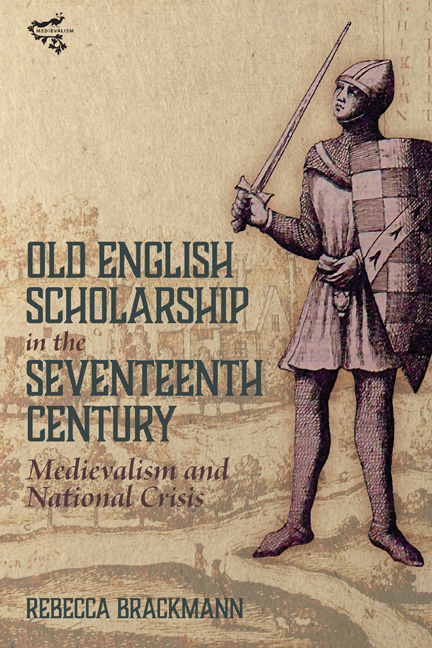Book contents
- Frontmatter
- Dedication
- Contents
- List of Illustrations
- Acknowledgments
- List of Abbreviations
- Note on Quotations
- Introduction: Medieval Studies in a Time of Crisis
- 1 Medievalism, the Self, and the World: Simonds D’Ewes and His Books
- 2 Abraham Wheelock’s Godly Historian: The 1643/1644 Bede
- 3 The Law’s Deep Roots: Roger Twysden’s Edition of William Lambarde’s Archaionomia and Leges Henrici Primi
- 4 Monuments and Memory: William Somner’s Antiquities of Canterbury and Poems on the Regicide
- 5 “The Saxons Live Againe”: William Somner’s Dictionarium Saxonico- Latino-Anglicum
- 6 The Echoing Past: William Dugdale and Early Medieval Warwickshire
- Epilogue: Texts in Conversation: John Milton’s Paradise Regained and the Old English Christ and Satan
- Bibliography
- Index
- Miscellaneous Endmatter
5 - “The Saxons Live Againe”: William Somner’s Dictionarium Saxonico- Latino-Anglicum
Published online by Cambridge University Press: 28 December 2023
- Frontmatter
- Dedication
- Contents
- List of Illustrations
- Acknowledgments
- List of Abbreviations
- Note on Quotations
- Introduction: Medieval Studies in a Time of Crisis
- 1 Medievalism, the Self, and the World: Simonds D’Ewes and His Books
- 2 Abraham Wheelock’s Godly Historian: The 1643/1644 Bede
- 3 The Law’s Deep Roots: Roger Twysden’s Edition of William Lambarde’s Archaionomia and Leges Henrici Primi
- 4 Monuments and Memory: William Somner’s Antiquities of Canterbury and Poems on the Regicide
- 5 “The Saxons Live Againe”: William Somner’s Dictionarium Saxonico- Latino-Anglicum
- 6 The Echoing Past: William Dugdale and Early Medieval Warwickshire
- Epilogue: Texts in Conversation: John Milton’s Paradise Regained and the Old English Christ and Satan
- Bibliography
- Index
- Miscellaneous Endmatter
Summary
HAD SOMNER BEEN a superstitious man, he might have had second thoughts about undertaking the compilation of an Old English dictionary for the purpose of publication. Several of his most notable predecessors had made a similar attempt, and all of them had been prevented by death – not only Wheelock and D’Ewes, but Johannes de Laet abroad, and (in the reign of Elizabeth) Laurence Nowell and John Joscelyn (1529–1603). Nonetheless, Somner remained undaunted by the string of mortalities following scholars’ resolutions to produce a printed dictionary of the earliest version of English. After all, while few of the above-mentioned scholars were elderly at their deaths, none were exactly young – one did not attempt such an undertaking until one had spent years, even decades, in the study of the language. Additionally, Somner had several advantages over his predecessors. First, he had their works to draw on. Nowell's manuscript dictionary was available to him, as was Joscelyn’s. The latter came in a copy by D’Ewes, who had augmented it with his own lexicographical efforts. What's more, Somner had compiled a glossary for Twysden's Historiae Anglicanae Scriptores X (1652), so he had lexicographic experience. He alone brought to the task not only thorough study of Old English, but hard-won expertise in compiling a dictionary. Somner also had, as Mary Joan Cook points out, several printed works to mine as resources, including Willliam L’Isle's 1623 A Saxon Treatise concerning the Old and New Testament, Wheelock's OE Bede and ASC, Lambarde's laws (re-issued by Wheelock and Twysden), and Junius's 1655 edition of the biblical poems in the manuscript now Oxford, Bodleian Library, MS Junius 11. Somner also made thorough use of the glossaries in British Library, Cotton Cleopatra A.iii, and the texts in British Library, MS Cotton Tiberius B.i (the OE Orosius, the Abingdon version of the ASC, and the Menologium), British Library, MS Royal 7 C.iv (Defensor's Liber Scintillarum glossed in OE), and British Library, MS Royal 12 D.xvii (Old English medical texts).
- Type
- Chapter
- Information
- Old English Scholarship in the Seventeenth CenturyMedievalism and National Crisis, pp. 127 - 161Publisher: Boydell & BrewerPrint publication year: 2023

